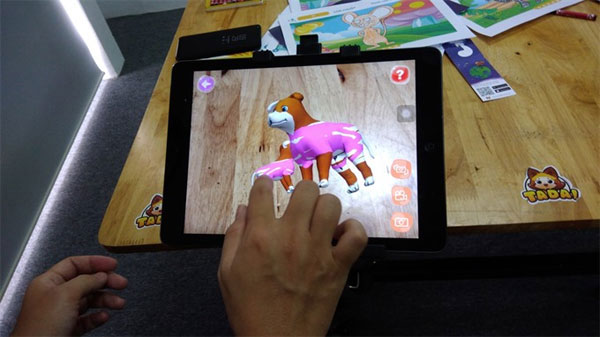VietNamNet Bridge – After dinner, Nguyen Minh Trang, 30, allows her five-year-old daughter, nicknamed Daisy, to use her tablet for 20 minutes to learn English.

Art meets tech: Readers can interact with their drawings, developing creativity and mental capacity. — File photo
Not too long ago, Trang had strictly forbidden her children from using electronic devices like smart phones or tablets because she did not want them to hurt their eyes, access inappropriate adult content and spend time playing games.
But, now, instead of segregating them, she and her husband guide their children on using electronic devices in a positive and effective way.
The change in strategy happened after Daisy met a little girl while waiting for the doctor. Trang saw Daisy’s eyes were glued to the tablet of her new friend. She seemed to be mesmerised by a colourful, musical game that she’d never seen before.
Trang understood that like other kids at her age, Daisy is always curious and eager to discover new things. She realised that it’s hard to prohibit her daughter from using the “smart” devices when everyone else around was doing so, because Daisy would be left out.
Trang decided that parents have to find suitable programmes for children and play with them as well as guide them to use the applications effectively.
“I believe that when parents spend time to choose applications to suit their children’s age and interests, smart phones and tablets can become ideal education tools,” she said.
Now, Daisy can listen to music on YouTube and learn English through Monkey Junior.
The English teaching software is designed by Dao Xuan Hoang and his team, so it’s content is especially suitable for Vietnamese children aged from four months to 10 years.
“Monkey Junior is the only application on Daisy’s tablet (beside basic system applications), so she won’t have a chance to access applications with adult content,” said Trang.
The programme has more than 1,000 lessons per language. Currently, the British English, American English, Vietnamese, French, Spanish and Chinese versions of the programme have been completed.
Each day, the child can go through one or more lessons of five-seven minutes each. The parents do not need to plan and prepare learning content.
Trang still feels that parents shouldn’t overuse the application’s advantages. Images and music of the application are attractive, but using the electronic devices for long periods of time will harm their health, she feels. On the other hand, if the children are allowed to use the programme for as long as they want, they would quickly lose their interest in it.
With just 20 minutes a day, Daisy is studying English and French on the application with interest and enthusiasm.
“The most important thing here is parents should learn and play with their children,” said Trang. “Never leave them alone with the smart phone or tablet and let them find out and manage the applications by themselves.”
Pham Mai Anh, CEO of ADT Creative Company, “mother” of Tada Books and Tada Magic Colour application, agreed.
“Using technology is an indispensable trend of modern life,” she said. “We shouldn’t avoid it or prohibit our children from using it, but show them how to use it effectively.”
Tada Books aim provoke children’s natural curiosity and creativity while directing them towards the right use of technology.
The Tada product is based on children’ special interest in colouring, and significantly enhances children’s learning/playing skills with augmented reality (AR) technology.
The products made by children using this programme vary – DIY (do it yourself) 3D animals, a creative photo of themselves or families playing in their 3D world, or a video clip recorded as a fun play.
The pure purpose of technology is not to replace life but to improve it, Anh said, adding that digital games should not and cannot replace physical activities, especially for kids, if their caregivers provide due guidance.
“We developed our product to encourage children to be active, both physically and intellectually,” she said.
“We strongly encourage family members to play together. These days, young parents do not spend much time with their children, and we hope our programme can help change that.”
Minh Thu
VNS